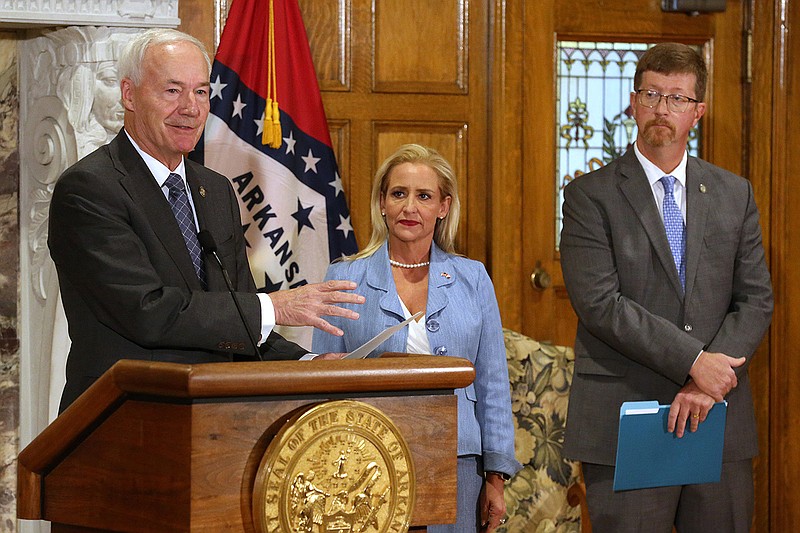Gov. Asa Hutchinson and Attorney General Leslie Rutledge announced their opposition Thursday to a proposed federal rule change on Title IX that would expand protections against discrimination to include gender identity and sexual orientation.
Title IX of the Education Amendments is a civil-rights law Congress passed in 1972 that protects students against discrimination based on their sex.
In June, the U.S. Department of Education proposed a rule change to Title IX to extend civil rights protections for LGBT students and employees. The law is often credited as expanding opportunity in female sports for high school and college athletes.
Hutchinson said the proposed rule change was a "detriment to women's sports" and if approved would put the state's law banning transgender women and girls from competing in female sports into conflict with the federal government.
"The proposed rules would make it clear that sexual orientation and gender identity are both covered under the non-discrimination laws for our schools," Hutchinson said in a statement. "This would interfere with Arkansas law, it would interfere with common sense, and it would interfere with local control."
In April 2021, the state Legislature passed a law that expands enforcement of the state's ban on transgender women and girls from competing in female sports in secondary schools and college athletics. Proponents of the law argue it strengthens fairness in high school and college athletics as athletes who are assigned male at birth but identify as female psychically outmatch their cisgender counterparts.
Hutchinson said if adopted, the rule change would put Arkansas into conflict with federal law and jeopardize millions in funding for school districts across the state.
"In the meantime, though, our school districts are in a difficult position because they'll be threatened with federal funds," Hutchinson said during a news conference at the Capitol. "And our counsel to the school districts is let's just proceed as we are doing now."
Rutledge announced Wednesday she signed a comment letter to the U.S. Department of Education along with 16 other GOP attorneys general that opposes the proposed rule change. But if the federal government adopts the rule change to Title IX it could lead to a legal challenge, Hutchinson said.
"The Biden Administration is simply trying to rewrite the statute for its own purposes and undermining the many accomplishments that we have gained in access for women in athletics," Rutledge said.
The debate over extending Title IX is not a new one. In 2016, the Obama Administration issued nonbinding guidance for schools to extend Title IX protections to include gender identity and sexual orientation. Hutchinson said he told Arkansas school districts at the time they were not required to follow the new federal guidance on Title IX. After taking office, the Trump administration rescinded the guidance.
In a June news release, the U.S. Department of Education cited a 2020 U.S. Supreme Court opinion that said Title VII of the 1964 U.S. Civil Rights Act protects employees from being discriminated based on race, color, national origin, religion or sex also applies to sexual orientation and gender identity.
According to the U.S. Department of Education, the proposed rule change would protect LGBT students and employees and the department "will engage in a separate rulemaking to address Title IX's application to athletics." The proposed rule change opens a 60-day comment period to give people a chance to weigh in.
"As we celebrate the 50th anniversary of this landmark law, our proposed changes will allow us to continue that progress and ensure all our nation's students -- no matter where they live, who they are, or whom they love -- can learn, grow, and thrive in school," U.S. Secretary of Education Miguel Cardona said in a June news release.
In the court's majority opinion in Bostock v. Clayton County, Associate Justice Neil Gorsuch wrote "it is impossible to discriminate against a person for being homosexual or transgender without discriminating against that individual based on sex."
Hutchinson said the Supreme Court's decision in Bostock only extends protections against discrimination for LGBT people in employment, not in education.
"They made it clear this was a narrow decision, so there is no application broader than that," Hutchinson said.

